Featured Courses
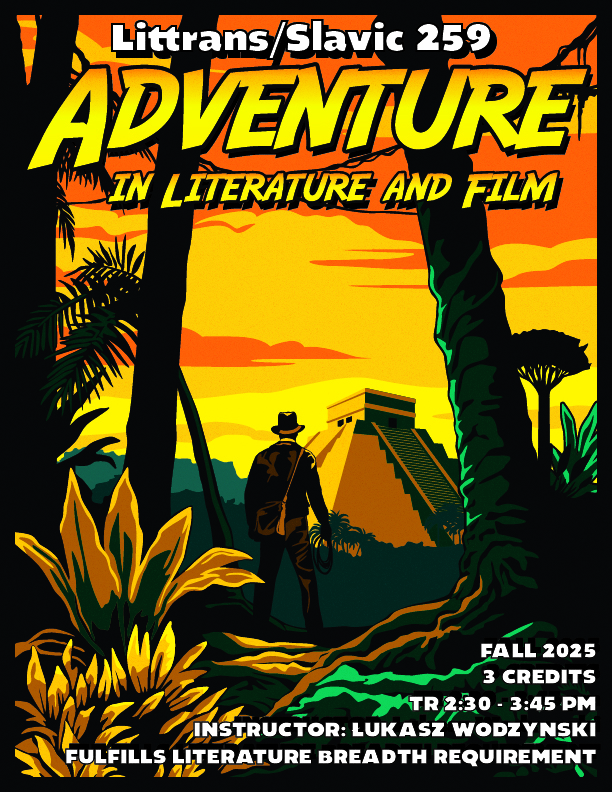
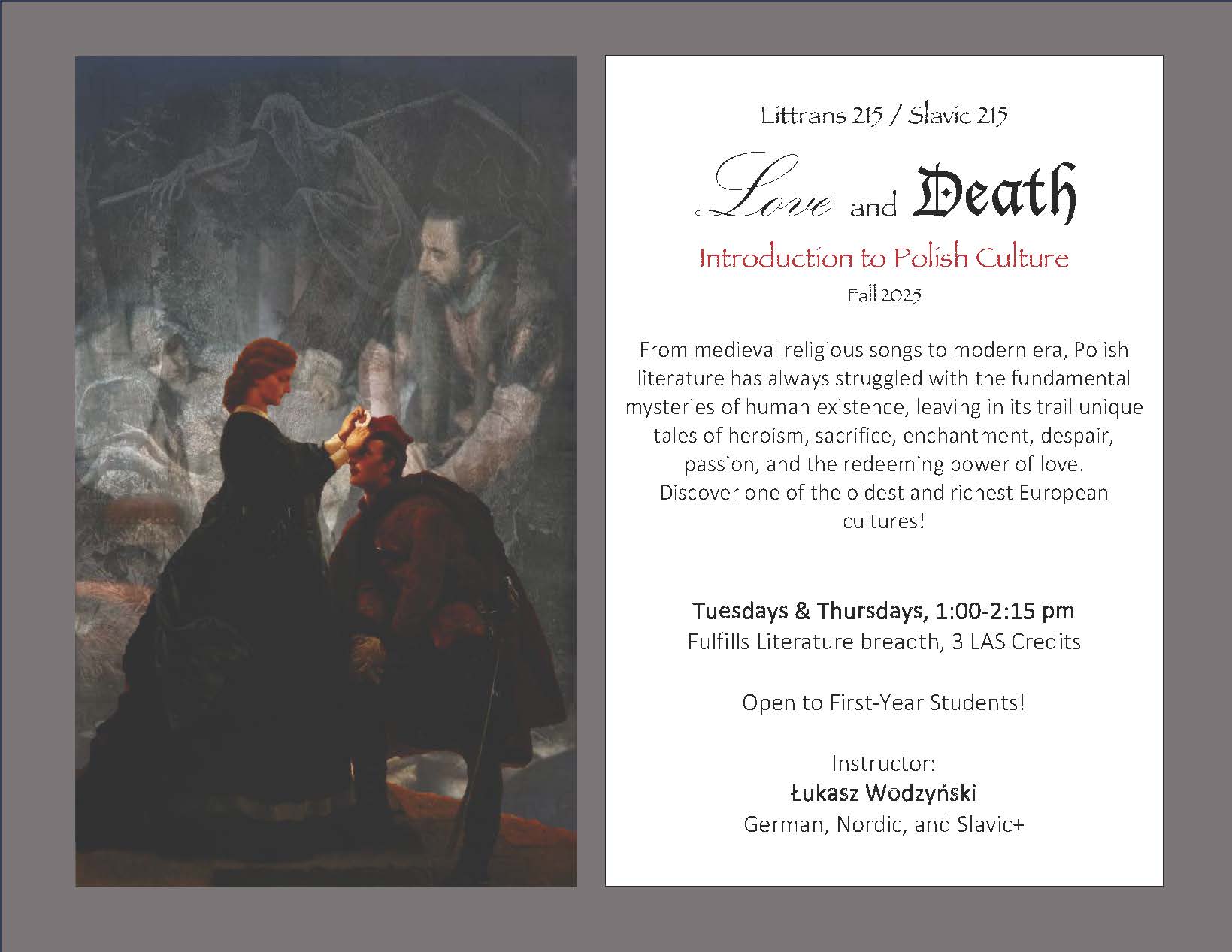
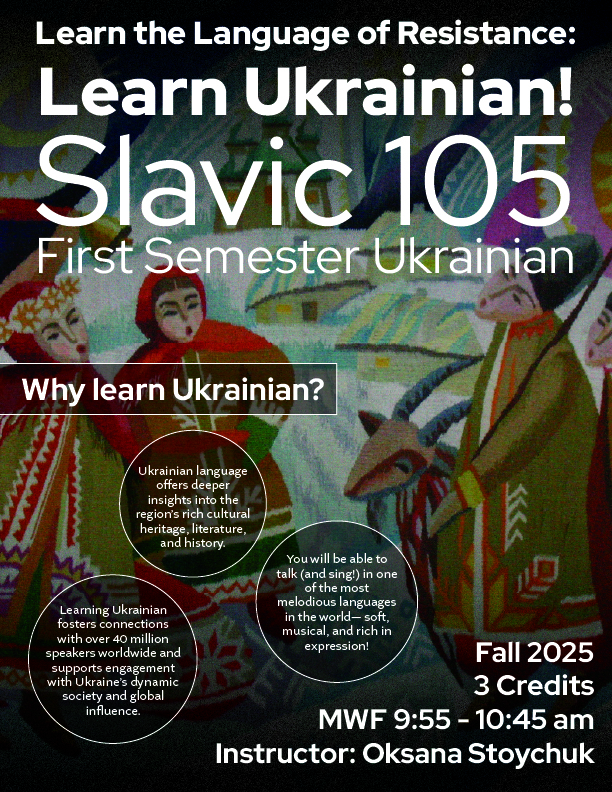
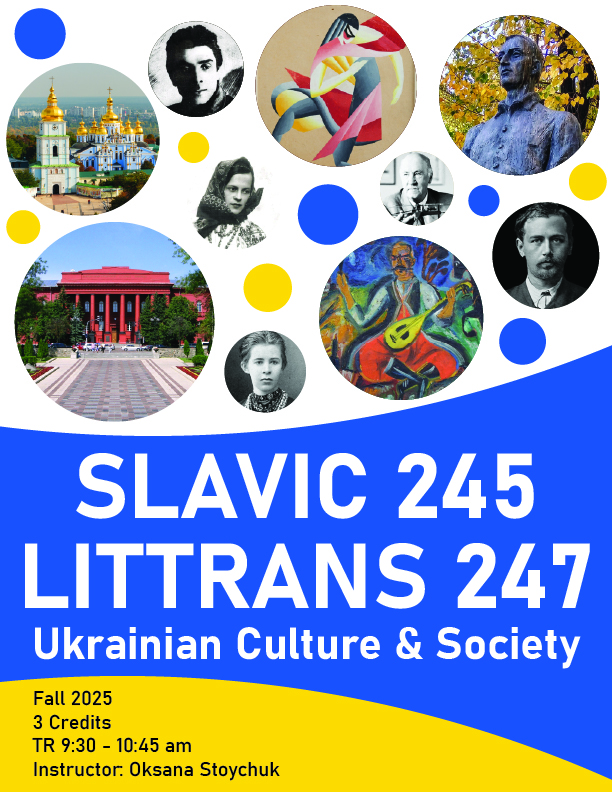
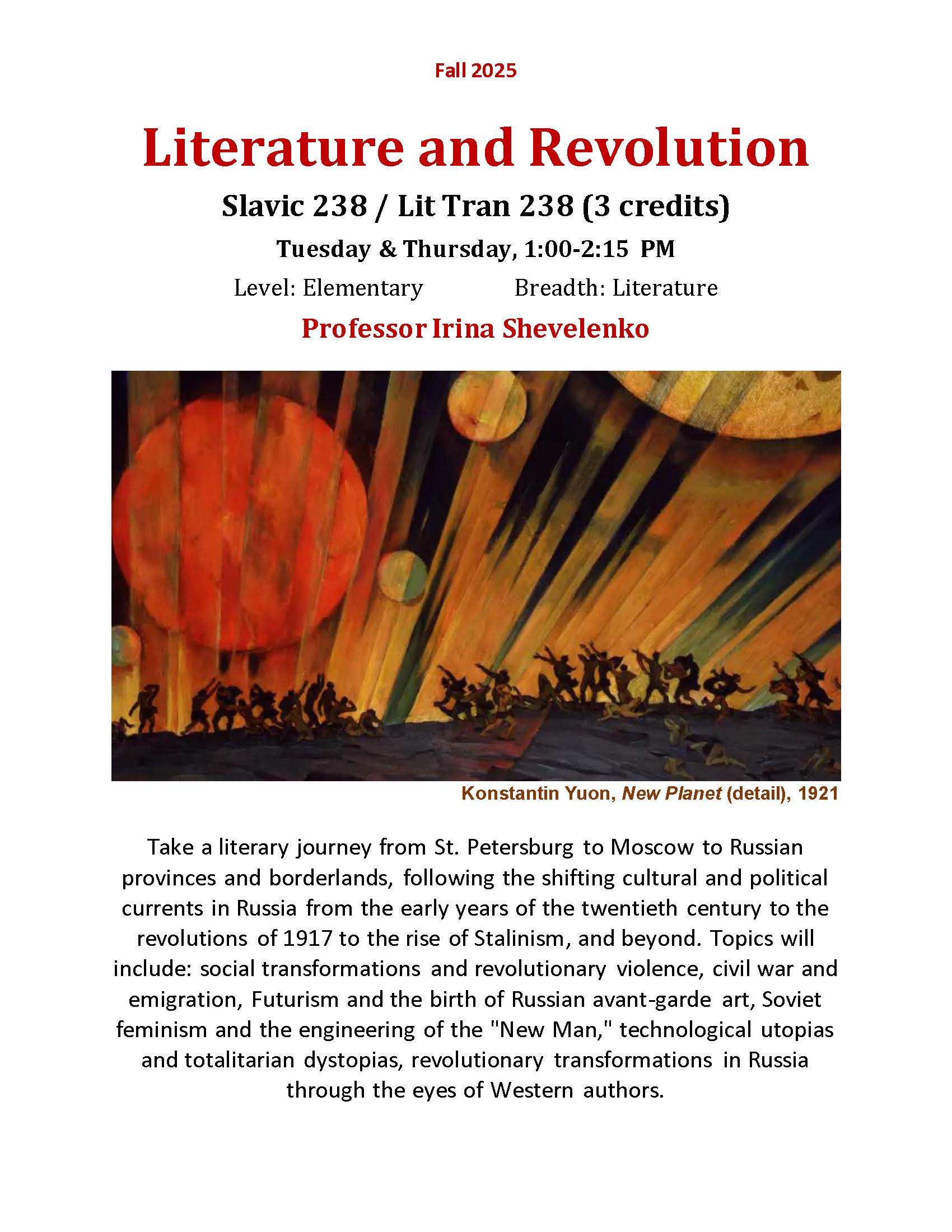
This is an accordion element with a series of buttons that open and close related content panels.
SLAVIC 101 - First Semester Russian
(4 Credits)
- Lecture 001: MTWRF 8:50 – 9:40 am
- Lecture 002: MTWRF 9:55 – 10:45 am
- Lecture 003: MTWRF 12:05 – 12:55 pm
- Lecture 004: MTWRF 1:20 – 2:10 pm
Instructor: Anna Tumarkin
Course Description: Five hours a week focusing on speaking, listening, reading and writing Russian, with an introduction to Russian culture. No previous knowledge of Russian expected.
Prerequisites: None.
SLAVIC 105 - First Semester Ukrainian
(3 Credits)
- Lecture 001: MWF 9:55 – 10:45 am
Instructor: Oksana Stoychuk
Course Description: This course is an introduction to the basics of the Ukrainian language and culture. Through a mix of activities and assignments, students will acquire elementary Ukrainian language skills in the four main areas: reading, writing, listening, and speaking. Regular written and speaking tests will help you solidify your language skills while homework assignments will ensure you practice and learn the new material. In this course, you will also learn about Ukrainian pronunciation, how to be a competent Ukrainian language user, when to use formal/informal language, and what colloquialisms Ukrainians like to use in everyday conversations. By learning the language in the larger context of Ukrainian culture, you will also acquire valuable cultural competence that will make your communication with Ukrainian speakers easier and more natural. While I realize that Ukrainian may not be the easiest language to learn for native English speakers, I am committed to helping you acquire the required Ukrainian proficiency, so that you successfully complete this semester.
Prerequisites: None
SLAVIC 111 - First Semester Polish
(4 Credits)
- Lecture 001: MWTR 11:00 – 11:50 am
Instructor: Oksana Stoychuk
Course Description: Introduction to Polish language focusing on speaking, listening, reading and writing with an introduction to Polish culture.
Prerequisites: None.
SLAVIC 203 - Third Semester Russian
(4 Credits)
-
- Lecture 001: MTWRF 9:55 – 10:50 am
- Lecture 002: MTWRF 12:05 – 12:55 pm
Instructor: Anna Tumarkin
Course Description: Five hours a week focusing on speaking, listening, reading and writing Russian, with continued study of Russian culture.
Prerequisites: SLAVIC 102.
SLAVIC 207 - Third Semester Polish
(4 Credits)
- Lecture 001: MTWR 11:00 – 11:50 am
Instructor: Krysztof Borowski
Course Description: Development of speaking, listening, reading and writing skills in Polish, with continued study of Polish culture.
Prerequisites: SLAVIC 112.
(Meets with GNS 370)
SLAVIC 215 - Love and Death: Introduction to Polish Literature & Culture
(3 Credits)
- Lecture 001: TR 1:00 – 2:15 pm
Instructor: Lukasz Wodzynski
Course Description: Description to come!
Prerequisites: None
SLAVIC 238 - Literature and Revolution
(3 Credits)
- Lecture 001: TR 1:00 – 2:15 pm
Instructor: Irina Shevelenko
Course Description: Take a literary journey from St. Petersburg to Moscow to Russian provinces and borderlands, following the shifting cultural and political currents in Russia from the early years of the twentieth century to the revolutions of 1917 to the rise of Stalinism, and beyond. Topics will include: social transformations and revolutionary violence, civil war and emigration, Futurism and the birth of Russian avant-garde art, Soviet feminism and the engineering of the “New Man,” technological utopias and totalitarian dystopias, revolutionary transformations in Russia through the eyes of Western authors.
Prerequisites: None
Crosslisted with LitTrans 238
Meets with Slavic 366 (graduate students only)
SLAVIC 245 - Ukrainian Culture and Society
(3 Credits)
- Lecture 001: TR 9:30 – 10:45 am
Instructor: Oksana Stoychuk
Course Description: This course is designed to introduce students to the fascinating world of Ukrainian culture from pre-Christian times to the present day. We will examine a number of cultural facets that help create Ukraine: history, folklore, language, art, literature, music, as well as current situation in Ukraine. We will learn how to tell fortunes with hot wax and what visual poetry means; we will learn the most popular Ukrainian (and American) Christmas carol and we will explore linguistic and historical nuances, which will help us embrace Ukrainian culture and history. All required texts are in English. In addition to the readings, we will include a variety of sources such as films, art works, cartoons and music.
Prerequisites: None
SLAVIC 259 - Adventure in Literature and Film
(3 Credits)
- Lecture 001: TR 2:30 – 3:45 pm
Instructor: Lukasz Wodzynski
Course Description: How do we define adventure and who gets to experience it? What role has it played in modern culture? What do adventure stories tell us about our values and changing attitudes to risk and violence? We will address these and similar questions on our intellectual journey through some of the most iconic adventures in Western cultural tradition, from The Odyssey to Indiana Jones, and beyond.
Prerequisites: None
SLAVIC 266 - Elementary Special Topics in Russian Literature & Culture
(3 Credits)
- Lecture 001: TR 1:00 – 2:15 pm
Instructor: Irina Shevelenko
Course Description: Description to come!
Prerequisites: None
SLAVIC 275 - Third Year Russian I
(3 Credits)
- Lecture 001: MWF 8:50 – 9:40 am
Instructor: Karen Evans-Romaine
Course Description: A thorough review of several major aspects of Russian grammar, focusing on the use of complex syntax in speech and writing. Read and discuss literary works and other Russian-language texts. Students will develop writing proficiency through compositions on a variety of topics.
Prerequisites: SLAVIC 118 or 204.
SLAVIC 277 - Third Year Polish I
(3 Credits)
- Lecture 001: MWF 12:05 – 12:55 pm
Instructor: Krzysztof Borowski
Course Description: In this course, students explore both traditional and evolving notions of culture in Poland, review grammar, and build vocabulary related to the cultural topics studied. The course places a strong emphasis on speaking and reading. Reading assignments include short stories, press articles, poetry, and a novel. Additionally, the program incorporates films, music, and visual arts.
Open to Freshmen
Contact Krzysztof Borowski (borowski3@wisc.edu) or Joanna Schuth (jschuth@wisc.edu), with any questions about the course or appropriate placement.
Prerequisites: Slavic 208 or a placement test. Contact Krzysztof Borowski (borowski3@wisc.edu) or Joanna Schuth (jschuth@wisc.edu) for placement test
SLAVIC 278 - Third Year Polish II
(3 Credits)
- Lecture 001: TR 12:05 – 12:55 pm
Instructor: Krzysztof Borowski
Course Description: In this course, students explore both traditional and evolving notions of culture in Poland, review grammar, and build vocabulary related to the cultural topics studied. The course places a strong emphasis on speaking and reading. Reading assignments include short stories, press articles, poetry, and a novel. Additionally, the program incorporates films, music, and visual arts.
Open to Freshmen
Contact Krzysztof Borowski (borowski3@wisc.edu) or Joanna Schuth (jschuth@wisc.edu), with any questions about the course or appropriate placement.
Prerequisites: Slavic 208 or a placement test. Contact Krzysztof Borowski (borowski3@wisc.edu) or Joanna Schuth (jschuth@wisc.edu) for placement test
SLAVIC 285 - Language and Worldview
(3 Credits)
- Lecture 001: TR 4:00 – 5:15 pm
Instructor: David Danaher
Course Description: Do languages shape the way we think? For bicultural individuals, the answer to this question is obviously yes. Even, however, for students who have attained an intermediate- or advanced-level proficiency in another language, the idea that languages present different “pictures of the world” – that language and worldview often go hand-in-hand – seems self-evident. Indeed, questions of cross-linguistic differences about the meanings of words and concepts (does French s’amuser bien have the same meaning as English to have fun?) could be said to represent more clear-cut and stark cases of similar questions of meaning within one language (is my idea of fun really the same as yours?). Language does, in a very real way, represent a certain “picture of the world”. If differences in how languages convey meaning exist, then it should certainly be possible to develop a framework for reflecting on these “linguistic pictures of the world”. This course represents both an introduction to semantic analysis (how do languages encode meaning?) as well as a content-based course in comparative ethnosemantics (to what extent does language shape the way we think and how can we systematically investigate this question?). Cross-linguistic case studies of the meanings of terms and concepts – everyday words like home, modes of conveying spatial orientation, words relating to human psychology – will serve as practical vehicles for an explanation and a discussion of the theory of a cultural approach to semantics. In addition to this, evidence for the encoding of culture in grammatical constructions and in discourse will be introduced. We will also examine the consequences of a cultural approach to language for reading and interpreting literature. This course requires no formal background in linguistics. The course lies at the intersection of humanities proper and social sciences. One of its primary goals is to hone critical-thinking skills related to language and culture that should prove relevant to any number of academic disciplines (literature, psychology, history, political science, philosophy, anthropology, sociology, communications, education, human geography) as well as to everyday self-understanding. Please note: this is an Honors-level course.
Prerequisites: This is an Honors-only course but students not in the Honors program may be allowed in with permission of the instructor.
SLAVIC 305 - Fifth Semester Intensive Polish
(3 Credits)
- Lecture 001: MWF 12:05 – 12:55 pm
Instructor: Krysztof Borowski
Course Description: The aim of the course is to help students to extend their knowledge of the language, as well as to enhance their literacy skills, and cultural awareness. Class activities are largely based on contemporary Polish prose and on articles from the Polish press related to contemporary Polish society. Students expend their vocabulary by engaging with texts from different genres, historical periods and perspectives. The syllabus includes working on grammar with written exercises and compositions. The course has a strong emphasis on speaking. Students work in groups, make presentations, and debate different issues in class discussions. A study of Polish culture is offered also through films, music and media.
Prerequisites: Slavic 204 OR placement test for other students including Freshmen.
(L&S Credit – Counts as Liberal Arts and Science credit in L&S. Counts for the Slavic Certificate)
SLAVIC 306 - Sixth Semester Intensive Polish
(3 Credits)
- Lecture 001: MWF 12:05 – 12:55 pm
Instructor: Krysztof Borowski
Course Description: In this course, students explore both traditional and evolving notions of culture in Poland, review grammar, and build vocabulary related to the cultural topics studied. The course has a strong emphasis on reading and speaking. The reading assignments are based on short stories, press articles, poetry, and a novel. Assignments will contain discussion questions, reading/listening comprehension activities, lexical, and grammar exercises.
Prerequisites: Slavic 305.
SLAVIC 315 - Russian Language and Culture I
(3 Credits)
- Lecture 001: TR 1:00 – 2:15 pm
Instructor: Alexandra Walter
Course Description: Emphasizes speaking and listening skills, helping students to converse on different stylistic levels, with varying degrees of formality, according to the rules of Russian speech etiquette.
Prerequisites: SLAVIC 118 or SLAVIC 204.
SLAVIC 321 - Fourth Year Russian I
(3 Credits)
- Lecture 001: MWF 1:20 – 2:10 pm
Instructor: Sara Karpukhin
Course Description: This course will focus on development of all four skills (reading, writing, speaking, and listening) in the interpretative (interpreting written and audio/video materials), interpersonal (speaking with others), and presentational (oral presentations to the class and written compositions) modes. The title of the textbook we will be using, Kagan et al.’s Russian: from Intermediate to Advanced, reflects the course goal: to enable students to progress in language proficiency from the Intermediate to the Advanced level in reading and listening, and to the Intermediate High level in speaking and writing. In addition, the course will enrich students’ cultural knowledge through reading and discussion of classical literary texts from Rosengrant’s The Golden Age.
Prerequisites: SLAVIC 276.
SLAVIC 331 - Fourth Year Polish I
(3 Credits)
- Lecture 001: MWF 12:05 – 12:55 pm
Instructor: Krzysztof Borowski
Course Description: In this course, students explore both traditional and evolving notions of culture in Poland, review grammar, and build vocabulary related to the cultural topics studied. The course places a strong emphasis on speaking and reading. Reading assignments include short stories, press articles, poetry, and a novel. Additionally, the program incorporates films, music, and visual arts.
Open to Freshmen
Contact Krzysztof Borowski (borowski3@wisc.edu) or Joanna Schuth (jschuth@wisc.edu), with any questions about the course or appropriate placement.
Prerequisites: Slavic 208 or a placement test. Contact Krzysztof Borowski (borowski3@wisc.edu) or Joanna Schuth (jschuth@wisc.edu) for placement test
SLAVIC 332 - Fourth Year Polish II
(3 Credits)
- Lecture 001: MWF 12:05 – 12:55 pm
Instructor: Krysztof Borowski
Course Description: In this course, students explore both traditional and evolving notions of culture in Poland, review grammar, and build vocabulary related to the cultural topics studied. The course places a strong emphasis on speaking and reading. Reading assignments include short stories, press articles, poetry, and a novel. Additionally, the program incorporates films, music, and visual arts.
Open to Freshmen
Contact Krzysztof Borowski (borowski3@wisc.edu) or Joanna Schuth (jschuth@wisc.edu), with any questions about the course or appropriate placement.
Prerequisites: Slavic 208 or a placement test. Contact Krzysztof Borowski (borowski3@wisc.edu) or Joanna Schuth (jschuth@wisc.edu) for placement test
SLAVIC 422 - Dostoevsky
(3 Credits)
- Lecture 001: MWF 11:00 – 11:50 am
Instructor: Andrew Reynolds
Course Description: Description to come!
Prerequisites: None
SLAVIC 433 - History of Russian Culture
(3 Credits)
- Lecture 001: MWF 12:05 – 12:55 pm
Instructor: Sara Karpukhin
Course Description: The primary aim of the course, the first one in a two-course sequence, is to offer an overview of those aspects of Russian history and culture which are most relevant in Russia today. The course will include a survey of the most important historical events of Russian history up to the end of the 18th century. The goal is to introduce you to the discussion of Russian culture in Russian, but the instructor will only occasionally correct your grammar in conversation, when your meaning is not communicative. We will continually practice all four skills (listening, reading, speaking, writing), but always in application to historical and cultural knowledge.
Prerequisites: SLAVIC 321.
SLAVIC 560 - Capstone Seminar in Russian Literature and Culture
(3 Credits)
- Lecture 001: TR 1:00 – 2:15 pm
Instructor: Anna Tumarkin
Course Description: This course, designed as a senior capstone course for advanced students of Russian and conducted in Russian, is devoted to in-depth reading of Mikhail Bulgakov’s novel The Master and Margarita and to studying its literary, cultural, and historical context.
Prerequisites: Slavic 321-322 or equivalent (fourth-year Russian) and one 400-level Russian course, or by consent of instructor.
SLAVIC 707 - Foundations in Russian Realism (~1840s-1890s)
(3 Credits)
- Lecture 001: F 2:30 – 5:00 pm
Instructor: Krill Ospovat
Course Description: Description to come!
Prerequisites: None
SLAVIC 820 - College Teaching of Russian
(1 Credit)
- Lecture 001: R 2:35 – 4:00 pm
Instructor: Anna Tumarkin
Course Description: This course is designed and required for current Slavic Department Russian-language Teaching Assistants and provides important professional development in course design, lesson planning, and assessment. Course participants work cooperatively to develop course activities and assessment instruments, and will learn how to identify and solve problems in the classroom.
Prerequisites: Consent of instructor.
SLAVIC 900 - Seminar: Slavic Literature and Culture
(1-3 Credits)
- Lecture 001: M 2:35 – 5:00 pm
- Lecture 002: W 2:30 – 5:00 pm
Instructor(s): Andrew Reynolds, Kirill Ospovat
Course Description: Description to come!
Prerequisites: None